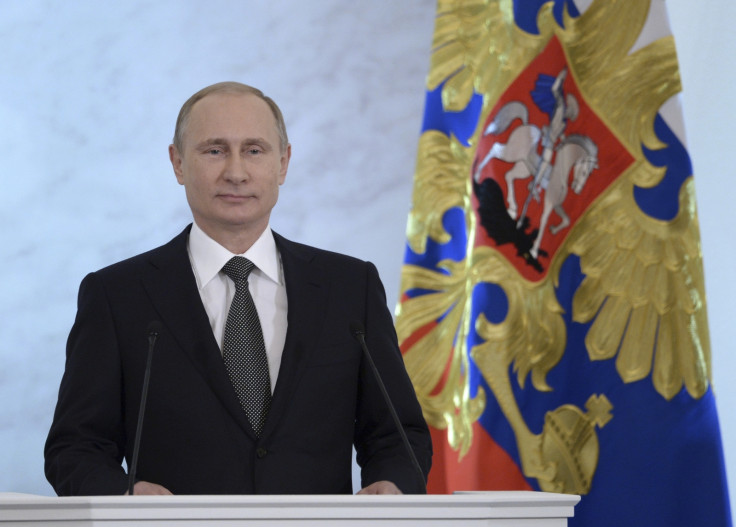Vladimir Putin accuses West of meddling and urges Russians to stick together as recession brews

Packed full of jingoistic punch and oozing defiance, Russian President Vladimir Putin's annual state-of-the-nation address to parliament offered a bleak outlook for those concerned with the country's economic slide.
Over the past 12 months, Moscow has defiantly embarked on a political campaign in neighbouring Ukraine, provoking wide-ranging economic sanctions that have left the country's economy battered.
Once touted as an emerging giant, economic growth has all but stopped in the country.
Throughout the 2000s, Putin presided over a prolonged period of economic growth, largely due to soaring energy prices upon which the economy relies. The president was quick to take credit for the economic prosperity that Russians were enjoying in his speeches.
However, Putin's tone has changed in recent months as the outlook has worsened. He now relies on rousing nationalistic rhetoric as he seeks to shift the blame for economic uncertainty from the Kremlin to foreign powers.
Oil price drop an issue for Putin
The massive drop in oil prices since the summer has hit Russian state coffers hard and poses the biggest threat to Putin. Along with natural gas, Russia relies on oil exports to generate around half of state revenue.
Moscow requires a price of around $100 a barrel to balance its government budget but benchmark Brent crude has fallen as low as $70 a barrel in December. With analysts predicting a steeper fall in the long term, Russia's state budget is likely to come under increased pressure.
Meanwhile, the rouble currency has slumped at an equally alarming rate. It suffered its biggest one-day losses on Monday 1 December, following months of volatility that have seen it lose 40% of its value against the dollar and 60% against the euro in 2014. As investors digested the contents of Putin's address, the rouble slid a further 1.6%.
Meanwhile, the country's businesses have been crippled by economic sanctions imposed by Western powers over Russia's annexation of Crimea. In turn, foreign investors have pulled out from the country in alarming numbers, with capital flight for 2014 alone steaming towards $130bn.
During his speech, Putin accused the West of meddling in Russia's internal affairs and decried sanctions as an attempt to try and "contain" Russia and stop it from growing too strong. In calling for Russians to stick together for the good of the nation, Putin asked the Russian parliament and the people to turn inward.
Apart from a decline in the range of European foodstuffs in the supermarkets, most Russians are yet to feel the impact of the sanctions or the falling oil price. The pain will be felt over the coming months and years.
Putin is prepared to accept long-term economic punishment in the face of widespread criticism from abroad. This was his call on the Russian people to stick with.
© Copyright IBTimes 2025. All rights reserved.





















